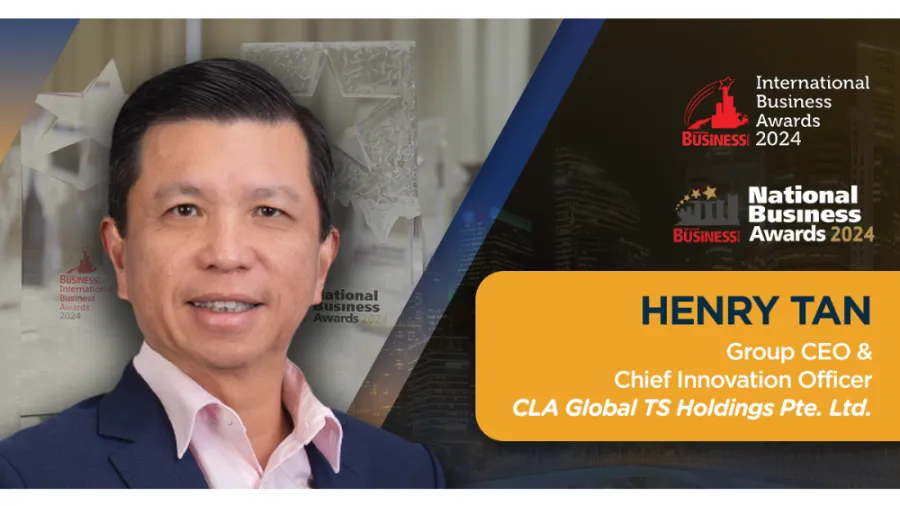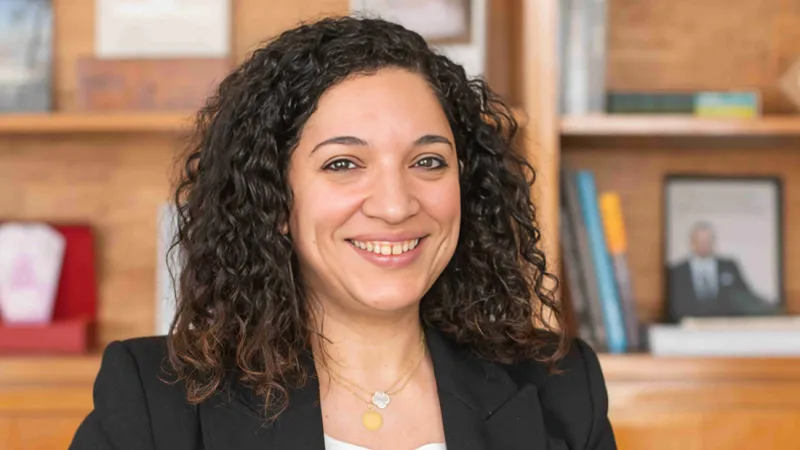
CLA Global TS’s Henry Tan underscores crucial role of digital tools and competitive advantage of sustainable practices
Tan emphasised the transformative power of digitalisation as a catalyst for economic recovery, particularly in engaging the region's youthful population and burgeoning middle class.
The business landscape in Singapore and the broader Southeast Asian region is undergoing a profound transformation. Singapore, nestled at the crossroads of trade and innovation, serves as a beacon for the dynamic shifts taking place. Meanwhile, the broader Southeast Asian region, with its youthful demographic and surging middle class, paints a canvas of unprecedented opportunities.
In this era of digitalisation and sustainability imperatives, businesses find themselves at the intersection of challenge and potential.
Henry Tan, Group CEO & Chief Innovation Officer at CLA Global TS, has a wealth of expertise in the business landscape. Holding a Bachelor's degree in Accountancy with First Class Honours from the National University of Singapore, Tan is a fellow of esteemed professional bodies, including the Institute of Singapore Chartered Accountants and the Institute of Chartered Accountants in Australia and New Zealand. His impressive array of roles, from being the former Treasurer of the Singapore Fintech Association to Council Member of the Institute of Singapore Chartered Accountants, reflects a multifaceted leadership style.
In his interview as a judge in the SBR National Business Awards and International Business Awards, Tan provided a nuanced perspective on the challenges and opportunities that businesses face today.
Tan underscored the transformative power of digitalisation, emphasising its role in economic recovery post-global pandemic. The conversation also turned to sustainability, as he highlighted the challenges businesses face, such as funding the sustainability transformation journey and engaging stakeholders.
With your extensive experience and leadership in various boards and organisations, what key insights can you share about the evolving business landscape in Singapore and the broader Southeast Asian region?
Digitalisation will continue to change how businesses operate. Businesses that can leverage digitalisation will recover economically from the global pandemic faster. Adoption of fintech technology and artificial intelligence (AI) will increase. Southeast Asia has a relatively young population and a rapidly growing middle class. The digital presence and usage of digital tools can effectively reach out to these talents and/or clients.
Sustainability is now at the forefront of business discussions. Business operations and strategy will need to be reconsidered to integrate the ESG goals of the organisation with its business performance.
Given your involvement in various professional organisations, such as the Institute of Singapore Chartered Accountants, what role do you believe professional associations play in advancing industry standards and fostering excellence in business practices?
Professional associations play an important role in elevating the standards and reputation of the profession. On the talent management front, professional associations provide a platform to share job opportunities and career advancement. Talents can also benefit through mentoring and guidance from experienced professionals within the association. On the professional development front, professional associations provide ongoing education programmes, resources, and industry news to keep professionals informed on the latest industry trends. On the business front, professional associations create networking activities to encourage collaboration with peers and leaders in the field. Additionally, most professional associations establish industry standards and business best practices that professionals can follow to maintain high standards within the industry.
What challenges and opportunities do you see for businesses in today's fast-paced, globalised economy, and how can they navigate these effectively?
Challenges will likely come from macroeconomic factors such as high-interest rates, inflation rates, rising commodity prices, and geopolitical tensions. These factors may lead to more trade restrictions and fragmented international trade relations. Having a strong management team, a governance board with the right credentials and a healthy balance sheet will help a business overcome such challenges.
Talent management is another challenge which many businesses face. Talents are always looking out for opportunities. Hence, as an employer, we need to ensure our people have great winning opportunities in terms of areas of learning, upgrading, exposure, advancement, broad thinking, experimental learning, hands-on usage of advanced tools, and exposure to cross-cultural and different geopolitical environments.
With Southeast Asian countries’ pro-growth policies, stable macroeconomics, and the availability of skilled talents, the Southeast Asia region has plenty of growth opportunities. Merger & Acquisitions could be a way for businesses to expand through collaboration to gain a competitive advantage.
With your involvement in sustainability reporting and excellence subcommittees, what do you see as the most critical sustainability challenges and opportunities for businesses in Singapore, and how can they integrate sustainable practices into their operations?
Some challenges in integrating sustainability practices include funding the Sustainability Transformation journey and engaging all stakeholders to create competitive advantage from environmental, social, and governance initiatives.
Funding a sustainability transformation will require the allocation of resources across the organization—capital expenses, operating expenses, and talent. Whilst it may sound like a huge investment, it is necessary for businesses to start integrating small changes in the early stages. Successes from these initial efforts could encourage buy-in and fund subsequent plans in the Sustainability transformation journey.
To implement new sustainable practices, engagement with stakeholders is important. Leaders must support the change, be committed, and be aligned with sustainability objectives. Leaders must demonstrate the new behaviours before engaging the organisation’s workforce. The entire firm needs to be engaged, committed, and have a clear sense of the sustainability transformation plan.
There are many initiatives to move people and businesses closer to ESG targets, to decarbonise, such as green financing and industry programmes. In addition to reducing the carbon footprint, businesses should also focus on the social and governance aspects of ESG, as it balances the needs of people and regulators with those of the environment to promote ambitious, yet achievable, targets for the companies it works with.
Frameworks such as Taskforce for Climate-related Financial Disclosures (TCFD) could be applied to a climate reporting programme at an organisation level. Businesses should consult sustainability and climate change business advisors to get advice on risks and opportunities businesses may face in Singapore, especially with the upcoming changes to the sustainability reporting regime that companies will face in the coming years.
How do you see the role of education in shaping the future of business, and what do you believe are the key skills and knowledge areas that upcoming business leaders should focus on?
In addition to academic education provided by relevant institutions, there is an increase in demand for mentorship and scholarship programmes. Such programmes create opportunities for young talent to gain industry insights and prepare themselves to join the industry upon graduation.
As a business leader, I work on building an ecosystem that encourages innovation and empowers our people to push boundaries to achieve both organisational and personal goals. One key skill that upcoming business leaders should focus on is listening to their talent and clients. Understanding their pain points and steering them towards evidence-based decisions can encourage growth.
What specific criteria and attributes do you look for when evaluating companies for the SBR National Business Awards and International Business Awards?
I hope to see more entries that are into sustainability, innovation, and solving digital issues like healthcare, wellness, care for the elderly, and food shortages.



![SBR 5 Lorem Ipsum News 2 [8 May]](https://cmg-qa.s3.ap-southeast-1.amazonaws.com/s3fs-public/styles/exclusive_featured_article/public/2025-05/a_hand_pointing_to_a_futuristic_technology_5b87c9d0e3_3.png.webp?itok=M3Hf-9XR)
![SBR 4 Lorem Ipsum [8 May Top Stories]](https://cmg-qa.s3.ap-southeast-1.amazonaws.com/s3fs-public/styles/exclusive_featured_article/public/2025-05/a_hand_pointing_to_a_futuristic_technology_5b87c9d0e3_2.png.webp?itok=2m5Wl0MX)


![Exclusive three SBR 12 Lorem Ipsum [8 May]](https://cmg-qa.s3.ap-southeast-1.amazonaws.com/s3fs-public/styles/exclusive_featured_article/public/2025-05/a_hand_pointing_to_a_futuristic_technology_5b87c9d0e3_11.png.webp?itok=8kn_UIfA)
![SBR 3 Lorem Ipsum [ Exclusive 2]](https://cmg-qa.s3.ap-southeast-1.amazonaws.com/s3fs-public/styles/exclusive_featured_article/public/2025-05/a_hand_pointing_to_a_futuristic_technology_5b87c9d0e3_1.png.webp?itok=YCyjLegJ)
![SBR 2 Lorem Ipsum [8 May]](https://cmg-qa.s3.ap-southeast-1.amazonaws.com/s3fs-public/styles/exclusive_featured_article/public/2025-05/a_hand_pointing_to_a_futuristic_technology_5b87c9d0e3_0.png.webp?itok=_cKD-29o)

![Video [Event News]](https://cmg-qa.s3.ap-southeast-1.amazonaws.com/s3fs-public/styles/event_news_featured_article/public/2025-05/screenshot-2025-05-08-at-4.58.53-pm_0.png.webp?itok=Kud35sMs)
![Event News SBR 9 Lorem Ipsum [8 may]](https://cmg-qa.s3.ap-southeast-1.amazonaws.com/s3fs-public/styles/event_news_thumbnail/public/2025-05/a_hand_pointing_to_a_futuristic_technology_5b87c9d0e3_8.png.webp?itok=DTh_dbYp)
![Event News SBR 9 Lorem Ipsum [8 May]](https://cmg-qa.s3.ap-southeast-1.amazonaws.com/s3fs-public/styles/event_news_thumbnail/public/2025-05/a_hand_pointing_to_a_futuristic_technology_5b87c9d0e3_7.png.webp?itok=vzDAzb6V)
![Event News SBR 8 Lorem Ipsum [8 May]](https://cmg-qa.s3.ap-southeast-1.amazonaws.com/s3fs-public/styles/event_news_thumbnail/public/2025-05/a_hand_pointing_to_a_futuristic_technology_5b87c9d0e3_6.png.webp?itok=jvHFc4P6)
![Video [Event News]](https://cmg-qa.s3.ap-southeast-1.amazonaws.com/s3fs-public/styles/video_thumbnail/public/2025-05/screenshot-2025-05-08-at-4.58.53-pm_0.png.webp?itok=yZnI0YBb)
![Video 1 SBR [8 May]](https://cmg-qa.s3.ap-southeast-1.amazonaws.com/s3fs-public/styles/video_thumbnail/public/2025-05/screenshot-2025-05-08-at-4.58.53-pm.png.webp?itok=9AAeRz_k)

 Advertise
Advertise

